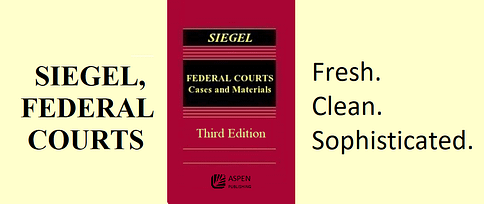PART I. JUSTICIABILITY, JURISDICTION, AND THE APPLICABLE LAW
-
1. The Nature of the Judicial Function
- A. The Principle of Judicial Review and Its Justification
- B. Judicial Review and the “Private Rights”–“Public Rights” Dichotomy
2. Justiciability
-
A. Advisory Opinions
- B. Finality of Judicial Rulings
- C. Standing to Sue
- D. Mootness
- E. Ripeness
- F. The Political Question Doctrine
3. Congressional Control of Jurisdiction
-
A. “Jurisdiction Stripping”
- B. Congress’s Power to Vest Article III Business in Bodies Other than Article III Courts
- C. Congress’s Power to Vest Article III Courts with Other than Article III Business
- D. Congressional Control over State Court Jurisdiction
4. The Law Applied in Cases in Federal Court
-
A. State Law in the Federal Courts
- B. Federal Common Law
- C. Rights of Action
5. Federal Jurisdiction
- A. Federal Question Jurisdiction
- B. Diversity Jurisdiction
- C. Supplemental Jurisdiction
- D. Removal Jurisdiction
PART II. LAWSUITS AGAINST GOVERNMENTS AND THEIR OFFICIALS
6. Federal Sovereign Immunity
- A. The Rule of Immunity
- B. Methods of Avoiding Federal Sovereign Immunity
7. State Sovereign Immunity
-
A. The Provocation
- B. The Response
- C. The Great Debate
- D. Methods of Avoiding State Sovereign Immunity
- E. A Few More Details
- F. Congressional Abrogation of State Sovereign Immunity
- G. Suits Against States in State Courts
8. Official Suits and Official Immunity
- A. Causes of Action
- B. Official Immunities
PART III. INTERSYSTEM RELATIONSHIPS
9. Abstention Doctrines and Related Restrictions on Federal Jurisdiction
- A. The Anti-Injunction Act
- B. Pullman Abstention
- C. Specialized Abstention Doctrines
- D. Younger Abstention
10. Supreme Court Review — Especially of Cases Decided by State Courts
- A. How Cases Reach the Supreme Court
- B. The Supreme Court’s Power to Review Cases Decided by State Courts
- C. The Scope of Supreme Court Review of Cases Decided by State Courts
- D. Review of State Court Decision by Inferior Federal Courts — The “Rooker-Feldman” Doctrine
11. Habeas Corpus
- A. Habeas Corpus for Persons Held Without Criminal Charge
- B. Habeas Corpus for Persons Held Pursuant to a Criminal Conviction

